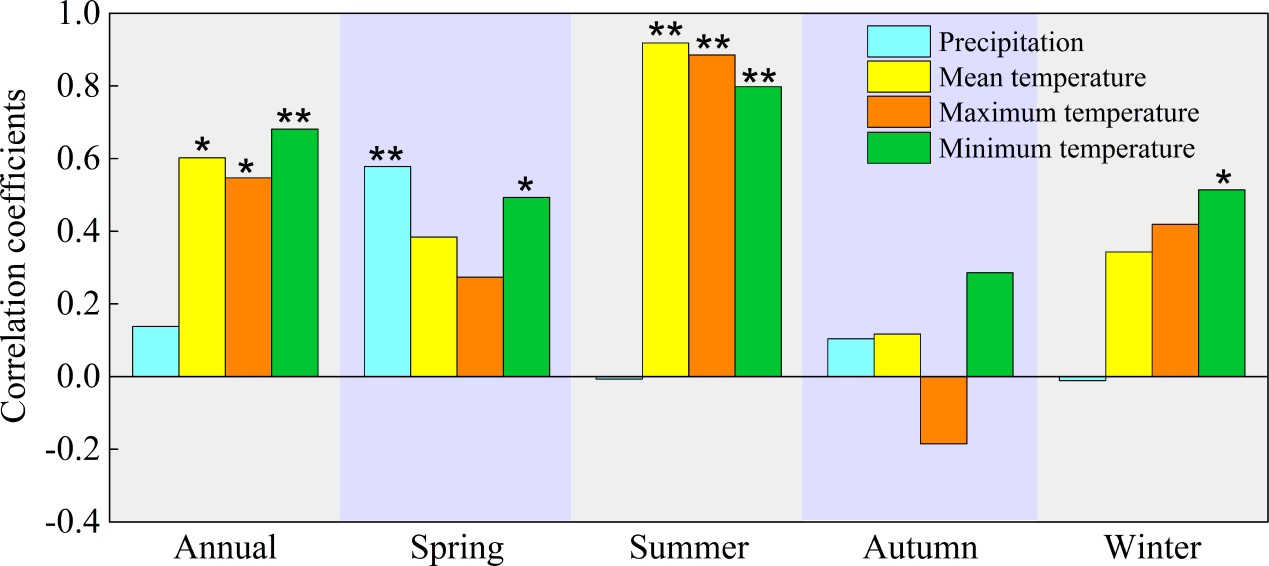As the highest plateau in the world, the Qinghai-Tibet Plateau has large areas of marshes, which has important effects on the biogeochemical cycle and carbon balance. As an important functional parameter of marsh wetland ecosystem, net primary productivity (NPP) of vegetation is an important indicator to measure the carbon sequestration potential of marsh wetland.
Climate change significantly affects the NPP of marsh wetland vegetation, and then affects the carbon fixation of marsh wetland. Until recently, the vegetation NPP changes of marsh and its response to climate change in the Qinghai-Tibet Plateau remain unclear.
Recently, a research team led by Prof. JIANG Ming from the Northeast Institute of Geography and Agroecology of the Chinese Academy of Sciences analyzed the spatiotemporal change in marsh NPP and determined its relationship with climate factors on the Qinghai-Tibet Plateau, based on MODIS NPP data and climate data from 2000 to 2020.
This work was published in Global Biogeochemical Cycles on July 20.
The researchers found that the average annual NPP of marshes on the Qinghai-Tibet Plateau increased significantly by 11.70 g C?m-2/10a during 2000-2020, with the most obvious increase in the northeast regions.
Daytime maximum and nighttime minimum temperatures had asymmetric effects on marsh NPP, with a larger positive effect of minimum temperature. Warmed minimum temperatures in winter and spring significantly increased the annual marsh NPP on the Qinghai-Tibet Plateau by reducing the occurrence of freezing injury.
In summer, the increasing maximum and minimum temperatures obviously promoted the vegetation growth in marshes. The reason may be that increasing daytime temperature will promote photosynthesis. Although warming at night will lead to enhanced respiration, the abundant water in marshes is prone to "over compensation", which leads to the increase of NPP.
In addition, the study found that in the early growth season, the increase of spring precipitation can promote the growth of marsh vegetation on the Qinghai Tibet Plateau.

Figure 1 Correlation coefficients between annual marsh NPP and climatic factors on the Qinghai-Tibet Plateau during 2000-2020.

Figure 2 Conceptual pattern for the mechanisms of climate change effects on marsh NPP in the Qinghai-Tibet Plateau.
This study highlights the importance of including seasonal climate conditions in models of marsh NPP, and indicates that the asymmetric impacts of daytime and nighttime temperatures on marsh vegetation should be adequately considered to assess the responses of marsh ecosystem to future climate conditions under the background of global asymmetrical warming between day and night.
"If only the mean temperature is considered, the positive impacts of future warming on the marsh NPP on the Qinghai-Tibet Plateau will be underestimated." said Dr. SHEN Xiangjin, first author of this paper.
The findings of this study can contribute to accurately estimate the carbon storage of marshes on the Qinghai-Tibet Plateau, and to further understand the relationships between climate change and alpine marsh ecosystem.
This work was supported by National Natural Science Foundation of China (41971065), Youth Innovation Promotion Association, CAS (2019235), Key Research Program of Frontier Sciences, CAS (ZDBS-LY-7019), and Natural Science Foundation of Jilin Province (20210101104JC), Innovation Team Project of Northeast Institute of Geography and Agroecology, CAS (2022CXTD02).
Contact: SHEN Xiangjin
Northeast Institute of Geography and Agroecology
E-mail: shenxiangjin@iga.ac.cn